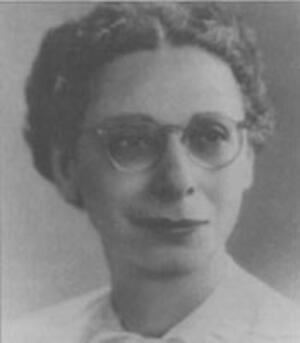Bessie Louise Moses
Bessie Louise Moses (1893-1965), circa 1922.
Image courtesy of the MAryland Historical Society via Wikimedia Commons.
Bessie Louise Moses graduated from Johns Hopkins University School of Medicine in 1922. She opened a private practice in Baltimore in 1924, taught obstetrics at the Hopkins School of Medicine, and ran the Maternal Health Clinic at Hopkins Hospital. In 1927, she founded the Bureau for Contraceptive Advice, the first birth control clinic in Baltimore, and organized contraceptive clinics throughout Maryland. She trained both white and African American doctors in gynecology and contraception and lectured frequently at women’s colleges to reach as wide an audience as possible. In 1950, she and Margaret Sanger were the first women honored with the Lasker Foundation Award in Planned Parenthood.
Article
Gynecologist, professor, and family planning pioneer Bessie Louise Moses spent a long professional life as a public health advocate and women’s health specialist.
Moses was born on December 21, 1893, in Baltimore, Maryland, one of three daughters of German Jewish philanthropists Bernard and Bertha (Manko) Moses. She graduated from Goucher College in 1915 and went on to graduate work at Johns Hopkins University, teaching biology at Sophie Newcomb College and zoology at Wellesley College before graduating from the Johns Hopkins University School of Medicine in 1922. Moses completed obstetrics and surgery internships at Johns Hopkins Hospital and at Woman’s Hospital of Philadelphia before opening a private practice in Baltimore in 1924. As an assistant gynecologist at Sinai Hospital, obstetrics instructor at the Hopkins School of Medicine, and the head of the Maternal Health Clinic at Hopkins Hospital, she gained extensive clinical experience and became passionately concerned with women’s health issues.
Moses founded the Bureau for Contraceptive Advice in 1927, the first birth control clinic in Baltimore, serving as its medical director for decades. Using the Bureau for Contraceptive Advice as a base, she organized contraceptive clinics and improved public health standards all over Maryland. She lectured on the medical advantages of planned parenthood and trained both white and African American doctors in order to spread contraceptive strategies and gynecological techniques to the widest possible audience. As part of her determination to reach a wide audience, Moses wrote Contraception as a Therapeutic Measure (1936), a book aimed at a popular readership.
In 1950, Moses received the Lasker Foundation Award in Planned Parenthood in conjunction with Margaret Sanger. Sanger and Moses were the first women to receive the Lasker Award, and the national press resulted in high demand for Moses as a speaker and teacher. She conducted seminars in marital relations at Goucher College, Hood, Randolph Macon, and a number of other women’s colleges. Goucher presented her with a citation in 1954 for distinguished scientific achievement, and her other alma mater, Johns Hopkins, elected her president of the Johns Hopkins Women’s Medical Association. She was a member of Phi Beta Kappa and Alpha Omega Alpha.
Moses achieved a solid reputation as a sensitive and receptive physician, and she continued her private gynecological practice until the last months of her fatal struggle with cancer. Her years of training doctors, health workers, and young women produced a network of highly trained, informed professionals. Moses’s deep involvement in family planning at a time when planned parenthood was a highly controversial subject was recognized when she was posthumously inducted into the Maryland Women’s Hall of Fame in 1991.
Bessie Louise Moses died on March 25, 1965, in Baltimore, the urban base from which her influence and innovation built a chain of family planning institutions that contributed to Maryland’s public health programs.
Monicken, Hannah. "Modern Day Moses: Dr. Bessie Moses Opened Baltimore's
First Birth Control Clinic and Shaped a Movement." Baltimore Jewish Times, May 27, 2016.
Klapper, Melissa. Ballots, Babies, and Banners of Peace: American Jewish
Women's Activism, 1890-1940. New York: New York University Press, 2013.
Moses, Bessie Louise. Maryland Room, Enoch Pratt Free Library, Baltimore.
NYTimes, October 19, 1950.
“Personalities and Projects: Social Welfare in Terms of Significant People.” Survey 86 (December 1950): 564–565; WWIAJ (1938).



